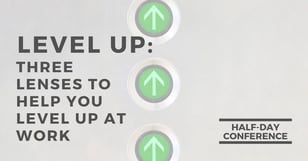A few years back, our kitten Scout was learning new skills in her daily adventures in the great outdoors. A neighbor’s cat had left a mouse at their doorstep, and the neighbor was inquiring if Scout had done that for us. For a moment, we watched Scout chase a grasshopper in the driveway, and then my daughter observed, “nope, Scout isn’t ready for mice or birds yet, she has only just leveled up to grasshoppers.”
Borrowed from the world of video games, that idea of “leveling up” implies that we’ve accomplished what we need to accomplish at this level, and we’re moving up to something more advanced. If you’ve ever leveled up in a game, you know that while you may have mastered level 3, when you first arrive at level 4, you haven’t learned all the techniques yet, and there may be some tricks you still need to learn as part of mastering level 4, before you “level up” to level 5.
It’s kind of similar in our workplaces, isn’t it? Start a new job, fairly green or novice, and eventually you master that, and “level up” to the next thing. Get promoted to team lead, and then “level up” to supervisor. Learn some new things as a supervisor, and eventually “level up” to being a manager, etc. You get the idea.
Whether it’s in people-leadership or in the technical domain in which you find yourself, “leveling up” is what keeps us (and our paychecks) growing in a workplace. If we come to work, day after day, for the same thing, with no opportunity to keep improving, we start to manifest that old adage “if you’re not growing, you’re dying”. We get grouchier and grouchier at work, more and more disengaged, and we start wondering if this is really all there is. Sometimes, when we hit a role where we know there’s no place to “level up” to, we start to look outside that organization for other opportunities so we can keep growing.
So what are some things we can do to “level up” where we are? Here are a couple of quick tips
Master your current job.
See if you can differentiate yourself as the stand-out. Learn what you need to learn, practice what you need to practice, and show up when you need to show up, so that you become the best at your job. The top tier are often the ones selected for promotion or forward movement.
Set short term and long term goals.
Spend a little time thinking about what success looks like for you in your current role and in whatever’s next for you. Set goals for yourself for your own development and growth, and create an action plan to achieve those goals. Set goals for the month or the quarter, set goals for the year or the role. Then take the steps necessary to achieve those goals.
Fix your attitude.
Sometimes when we feel “stuck” it shows on our faces and in our work products. When someone looks at their work or their role as a drudgery or an obligation rather than an opportunity, that can often manifest itself as apathy which then erodes the quality of our work and interactions. Change your frame of mind to embrace your role and look at it as a launching pad for whatever’s next for you.
Engage your passion on a regular basis.
If you’re not particularly passionate about the role you’re in or the industry you’re in, find something you are passionate about, and engage in that as a hobby or a daily diversion. Or, if you are (or once were) passionate about the work you do or the industry you’re in or the employer you work for, let that shine through! Step up and volunteer for opportunities at work that let you tap into your natural strengths. It’s okay to have fun at what you’re doing - in fact, that will help you level up.
Get connected with your industry and subject.
The more you know about your industry and subject area, the more you’ll be able to see opportunities where you can participate and where you can contribute. Becoming an expert or a recognized thought leader in your industry is a great way to level up. Even knowing the experts and tapping into their expertise from time to time is a great way to grow and to become familiar with what’s out there in your field.
Create your personal brand.
Beyond your particular role, develop your personal brand. Who are you as a professional? What makes you stand out? What makes you excellent? A personal brand is one of your most valuable assets. It helps put yourself in a position of power in the job search and interview process - for internal opportunities as well as opportunities outside your current employer. The more you understand your value, the easier it becomes to articulate it and to distinguish yourself among other candidates.
Want to learn more? We’ve brought three of our coaches together for a half-day event to help you level up, starting now. Click here to learn more or register.









